- Home
- David McCullough
The Wright Brothers Page 2
The Wright Brothers Read online
Page 2
Once, in 1859, the front lawn of the old Greek Revival courthouse was the setting for a speech by Abraham Lincoln. Otherwise not a great deal of historic interest had taken place in Dayton. It was, however, spoken of proudly as a fine place to live, work, and raise a family, as indeed was all of Ohio. Was Ohio not the native state of three presidents thus far? And of Thomas Edison? Another of Dayton’s notable sons, William Dean Howells, editor of The Atlantic Monthly, had written that the people of Ohio were the sort of idealists who had “the courage of their dreams.”
By this courage they have made the best of them come true, and it is well for them in their mainly matter-of-fact and practical character that they show themselves at times enthusiasts and even fanatics.
In a speech years later Wilbur would remark that if he were to give a young man advice on how to get ahead in life, he would say, “Pick out a good father and mother, and begin life in Ohio.”
If, in 1884, a new railroad station was plainly in need and most of the streets in town were still unpaved, the prospects for future prosperity were brighter than ever. Most importantly, the National Cash Register Company had been founded and was thriving. In little time it would become the largest manufacturer of its kind in the world. Bishop Wright knew his life on the road would continue half the year or more. Nonetheless, there was never a question that Dayton was home.
An important part of the family’s education in geography, not to say a continuing stimulant for their curiosity, was supplied by the Bishop in long letters written during his travels, often while on board a train. However far his travels, his love of his country and its splendors remained abundantly evident. Minneapolis and St. Paul were “cities of marvelous growth, in a wonderful wheat-producing country.” He wrote with enthusiasm and amazement. So steep were the grades over the mountains west of Missoula that three locomotives were required, two in front, one behind, he reported to those at home. His world, and consequently theirs, kept growing. “Yesterday, I came down here, starting at 1:40 a.m.,” he reported in a letter mailed from Biggs, California.
You ought to have seen [the] Siskiyou mountains which we crossed yesterday on the cars. We rose pretty high, and to make grades, wound about for miles to get only a few. After a mile’s run we would come back to 200 feet from where we were before, about 175 feet higher up. We [ran] through several tunnels, but none long, the last at the summit being the longest. It is the grandest scenery and highest rapid grade I ever went through.
From wide reading and observations of life, he had acquired what seemed an inexhaustible supply of advice on behavior, habits good and bad, things to beware of in life, goals to strive for. He lectured on dress, cleanliness, economy. At home he preached courage and good character—“good mettle,” as he would say—worthy purpose and perseverance. Providing guidelines he understood to be part of a father’s duty.
It is assumed that young folks know best, and old folks are fogies. It may be so, but old folks may be as right about new fangles as young folks are about fogy ways.
Make business first, pleasure afterward, and that guarded.
All the money anyone needs is just enough to prevent one from being a burden on others.
He made a point of treating the three of his children at home with equal consideration and affection, praising each for his or her particular talents or contributions to the family. But plainly his favorite was Wilbur, “the apple of his eye,” as Katharine said.
Wilbur had also been the cause of the greatest worry. In his youth he had excelled in everything. He had been a star athlete—in football, skating, and gymnastics especially—and outstanding as a student. In his last full year of high school in Dayton, his grades were in the 90s in everything—algebra, botany, chemistry, English composition, geology, geometry, and Latin. There was talk of his going to Yale.
But all such plans ended when, playing hockey on a frozen lake beside the Dayton Soldiers’ Home, Wilbur was smashed in the face with a stick, knocking out most of his upper front teeth.
What exactly happened is hard to determine, but to judge from the little that is known, there is much more to the story. According to an entry in Bishop Wright’s diary written years afterward, in 1913, the “man who threw the bat that struck Wilbur” became one of the most notorious murderers in the history of Ohio, Oliver Crook Haugh, who, in 1906, was executed for the murders of his mother, father, and brother, and was believed to have killed as many as a dozen others besides.
At the time of the hockey incident, Haugh lived just two blocks from the Wrights. He was only fifteen, or three years younger than Wilbur, but as big as a man and known as the neighborhood bully. As would be written in the Dayton Journal following his execution, “Oliver never was without the wish to inflict pain or at least discomfort on others.”
Whether he “threw” the stick at Wilbur accidentally or intentionally is impossible to determine. But it is known that he was then working in a drugstore on West Third Street and that the druggist, in an effort to relieve him of the pain of rotting teeth, was providing him with a popular cure of the day, “Cocaine Toothache Drops.” In little time young Haugh became so dependent on drugs and alcohol, his behavior so out of control that he had to be committed for several months to the Dayton Asylum for the Insane.
Wilbur undoubtedly knew him, but how well, or whether Haugh had some sort of score to settle with Wilbur, or was under the influence of drugs at the time of the incident, are all unknown. Except for Bishop Wright’s brief diary mention, nothing on the subject is to be found anywhere in the Wright family correspondence or reminiscences. Nor is there much in the way of detail or firsthand description about the devastating after-effect of the accident on Wilbur. The whole episode seems to have been something the family wished to put behind them and remains a dark corner in Wilbur’s life about which too little is known. But clearly it changed the course of his life.
For weeks he suffered excruciating pain in his face and jaw, then had to be fitted with false teeth. Serious digestive complications followed, then heart palpitations and spells of depression that seemed only to lengthen. Everybody grew more and more concerned. All talk of Yale ended. His ailing mother did what she could to care for him, but as her own health kept steadily deteriorating, he began looking after her.
“Such devotion of a son had rarely been equaled,” wrote the Bishop, who would credit Wilbur with lengthening her life at least two years. In the morning she usually felt strong enough to come down, with some help, to the first floor, but at night Wilbur would have to carry her back upstairs.
Brother Lorin seems to have been the only one who disapproved. “What does Will do?” he wrote Katharine from Kansas, where he had gone to seek his fortune. “He ought to be doing something. Is he still cook and chambermaid?”
Wilbur remained a recluse, more or less homebound, for fully three years—three years when he began reading as never before.
The Wright house at 7 Hawthorn Street, the setting of so much of the family’s life, was modest in size and appearance, and located in a comparably modest neighborhood. Like much of Dayton, Hawthorn Street remained unpaved until shortly after the turn of the century, and Number 7, with two linden trees and a stone hitching post in front, was a narrow, white frame structure very like others on the street, except for a decorative, wraparound front porch built by the brothers.
There were seven rooms, three downstairs, four up, all of them small, as was the lot. Only two feet separated the house from Number 5 next door on the north side. To get between the houses required one to turn and walk sideways.
The brothers were well into their twenties before there was running water or plumbing in the house. Weekly baths were accomplished sitting in a tub of hot water on the kitchen floor, with the curtains drawn. An open well and wooden pump, outhouse, and carriage shed were out back. There was no electricity. Meals were cooked on a wood stove. Heat and light were provided by natural gas. House and property had a total value of perhaps $1,800.
<
br /> The front door opened from the porch into a small, formal front parlor, but most everyone came and went by a side door on the porch that opened into the sitting room. From there the front parlor was to the right, dining room and kitchen to the left. A narrow carpeted stairway led to the bedrooms above.
The first-floor furnishings were all of the inexpensive Victorian variety to be found in homes throughout Ohio, or for that matter nearly everywhere in the country at the time—the lace curtains at the windows in the front parlor, the upholstered wooden rockers and Gilbert clock on the mantelpiece that chimed every hour and half hour, the mirrored oak sideboard in the dining room. High ceilings and the modest scale and simplicity of the furnishings made the rooms considerably less cramped in feeling than they might have been.
The decor upstairs consisted of bare essentials only—beds, bureaus, chamber pots—with the exception of the bookcase and rolltop desk in the Bishop’s cluttered bedroom at the front of the house overlooking the street. Wilbur slept in the room in the middle, Orville and Katharine in the two rooms at back. Since the gas fireplaces downstairs provided the only heat, bedroom doors upstairs had to be kept wide open during cold weather.
With the tracks of the Dayton Western and Union Railroad only blocks away, the sound of train whistles was part of the night in all seasons. The smell of coal smoke in the air was the smell of home.
The Wright family book collection, however, was neither modest nor commonplace. Bishop Wright, a lifelong lover of books, heartily championed the limitless value of reading.
Between formal education at school and informal education at home, it would seem he put more value on the latter. He was never overly concerned about his children’s attendance at school. If one or the other of them chose to miss a day or two for some project or interest he thought worthy, it was all right. And certainly he ranked reading as worthy.
Those works he considered “very serious,” on theology mostly, were in his bedroom, the rest, the majority, proudly in evidence in the sitting room in a tall, glass-fronted bookcase. There could be found the works of Dickens, Washington Irving, Hawthorne, Mark Twain, a complete set of the works of Sir Walter Scott, the poems of Virgil, Plutarch’s Lives, Milton’s Paradise Lost, Boswell’s Life of Johnson, Gibbon’s Decline and Fall of the Roman Empire, and Thucydides. There were books on natural history, American history, a six-volume history of France, travel, The Instructive Speller, Darwin’s On the Origin of Species, plus two full sets of encyclopedias.
Everyone in the house read all the time. Katharine favored the novels of Sir Walter Scott; Orville, Hawthorne’s The House of the Seven Gables, while Wilbur—and particularly during his homebound lacuna—read just about everything, but had a particular love of history.
In those interludes when the Bishop was at home, he insisted on time with his books or he could be found at the public library pursuing his love of genealogy. As one who so strongly believed in the importance of family, he could not know enough about those from whom he and his children were descended. He wanted to make them aware of that, too, just as he wanted them to have open and receptive minds and to think for themselves. As said, his was a mind that never slowed down. “He talked very freely to his children on all subjects,” Orville would say, “except money making, a matter to which he gave little consideration.”
Included among the ecclesiastical works on his bedroom shelves were the writings of “The Great Agnostic,” Robert Ingersoll, whom the brothers and Katharine were encouraged to read. “Every mind should be true to itself—should think, investigate and conclude for itself,” wrote Ingersoll. It was the influence of Ingersoll apparently that led the brothers to give up regular attendance at church, a change the Bishop seems to have accepted without protest.
Interestingly, for all the Bishop’s dedication to church work, religion was scarcely ever mentioned in his letters to his children, or in what they wrote to him. No framed religious images or biblical quotations were part of the home decor, with the exception of a color print of Saint Dorothy, hanging to the left of the fireplace in the front parlor, but that was the part of the room where Orville customarily propped his mandolin against the wall, and she was the patron saint of music.
Years later, a friend told Orville that he and his brother would always stand as an example of how far Americans with no special advantages could advance in the world. “But it isn’t true,” Orville responded emphatically, “to say we had no special advantages . . . the greatest thing in our favor was growing up in a family where there was always much encouragement to intellectual curiosity.”
II.
In early 1889, while still in high school, Orville started his own print shop in the carriage shed behind the house, and apparently with no objections from the Bishop. Interested in printing for some while, Orville had worked for two summers as an apprentice at a local print shop. He designed and built his own press using a discarded tombstone, a buggy spring, and scrap metal. “My father and brother seeing my determination to become a printer, managed after a while to get a small printing press for me,” Orville later explained, and with the help of Wilbur, who was ready to resume life again, he began publishing a newspaper, the West Side News, devoted to the goings-on and interests of their part of Dayton on the west side of the river.
A first edition of four pages appeared on March 1 carrying the advertisements of seventeen local establishments, including F. P. Nipkin’s drugstore, W. A. Lincoln’s Dry Goods (offering “BIG BARGAINS”), Winder’s Grocery, the Cleveland Laundry, and the H. Ruse Feed Store. Orville was listed as publisher. The subscription rate was 45 cents a year, or two weeks for 10 cents.
The editorial content for this and the editions that followed consisted mainly of one short article of general interest along with numerous bits and pieces of local news, these selected by Wilbur apparently. One could read of a freight car breaking down on the Wolf Creek bridge or that the Shakespearean reading by Professor C. L. Loos at the high school was widely appreciated by the large audience present, that the trunk factory of W. I. Denny had burned to the ground, or that George La Rue of South Hawthorn Street had presented his large collection of bird eggs to the public library. Or that Miss Carrie B. Osterday of West Third Street, and G. J. Nicholas and Tula Paisly Street were all sick with typhoid fever. Or that police officers O’Brien, Urmey, and Kitzelman had arrested Ed Kimmel and another boy for stealing chickens.
At the same time one could also find mention of the disastrous flood at Johnstown, Pennsylvania, or the completion of the Eiffel Tower in Paris.
Now and then the brothers would include items from other publications that they judged worthy of the readers’ attention, such as one titled “Encourage Your Boy,” reprinted from Architect and Building News.
Do not wait for the boy to grow up before you begin to treat him as an equal. A proper amount of confidence, and words of encouragement and advice . . . give him to understand that you trust him in many ways, helps to make a man of him long before he is a man in either stature or years. . . .
If a boy finds he can make a few articles with his hands, it tends to make him rely on himself. And the planning that is necessary for the execution of the work is a discipline and an education of great value to him.
By the end of April, with the paper showing some profit, Orville moved the business to a rented space on West Third Street, where the city’s electric trolley ran, and Wilbur, now twenty-two, was prominently listed as editor.
A high school friend of Orville’s, Paul Laurence Dunbar, who had been the class poet and the only black student in the school, became a contributor to the West Side News. Later, when Dunbar proposed doing a weekly paper for the black community, Orville and Wilbur printed it on credit, but it lasted only a short time.
At some point, Dunbar is said to have chalked on the shop wall this quatrain tribute:
Orville Wright is out of sight
In the printing business.
No other mind is half so brig
ht
as his’n is.
In 1893, through the influence of Bishop Wright, a first collection of Dunbar’s poems was published by the United Brethren Church, for which Dunbar himself paid the cost of $125. In another few years, having been discovered by the editor of The Atlantic Monthly, William Dean Howells, Dunbar had become a nationally acclaimed poet.
That July of 1889 the paper carried the obituary of Susan Koerner Wright. Which brother wrote it is unknown. Most likely it was a joint effort. She had died at home on July 4, at age fifty-eight, after an eight-year struggle with tuberculosis.
She was of retiring disposition, very timid and averse to making any display in public, hence her true worth and highest qualities were most thoroughly appreciated by her family.
She was buried two days later at Woodland Cemetery, her whole family present. Never afterward was July 4 to be a day of celebration in the family. As the Bishop would write in another July to come: “The Fourth had its Chinese firecrackers . . . [and] Hawthorn Street furnished several displays, but No. 7 was not patriotic. Not a drum was heard, not a flag was [un]furled, and not a firecracker snapped there.”
A year later, the brothers changed the name of their paper to The Evening Item, and the year following the Item ceased and they concentrated on making money as job printers.
The printing business had been Orville’s idea from the start, and he enjoyed it most, working as hard as he could. But he seems to have found Wilbur’s performance lacking. “We’ve been so busy for the past few weeks that we’ve had very little time to write,” Orville reported to their father in the fall of 1892. “I’ve been making $2.00 to $3.25 a day in the office, but I have to divide it with Will so that when the week is over I don’t have much left. Will’s working on the press, at least he says he is, but I can see little signs of it from the appearance of things.” At home, however, he reassured the Bishop, they were “getting along real well.”

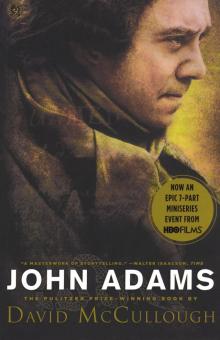 John Adams
John Adams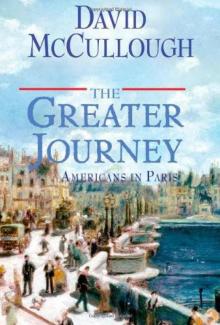 The Greater Journey: Americans in Paris
The Greater Journey: Americans in Paris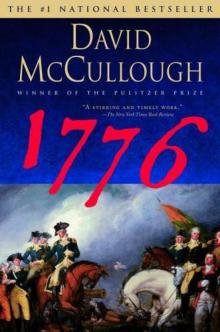 1776
1776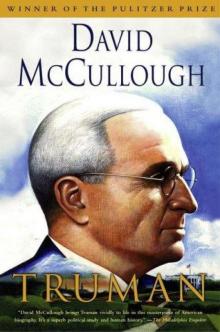 Truman
Truman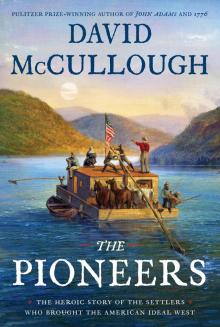 The Pioneers
The Pioneers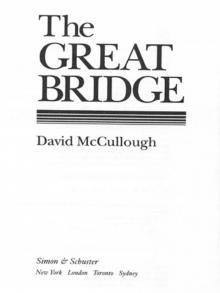 The Great Bridge: The Epic Story of the Building of the Brooklyn Bridge
The Great Bridge: The Epic Story of the Building of the Brooklyn Bridge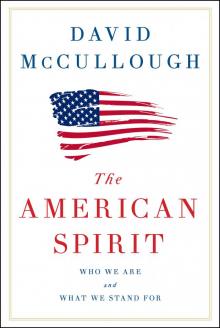 The American Spirit
The American Spirit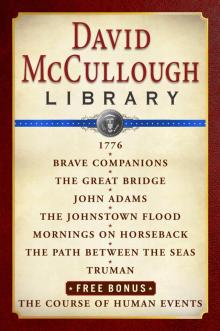 David McCullough Library E-book Box Set
David McCullough Library E-book Box Set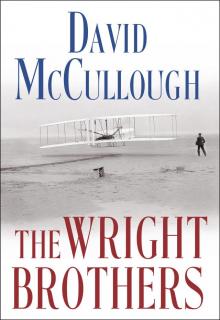 The Wright Brothers
The Wright Brothers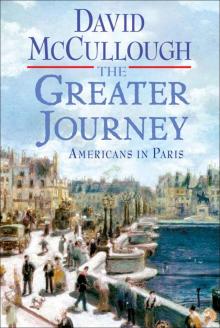 The Greater Journey
The Greater Journey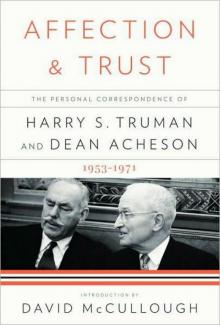 Affection and Trust: The Personal Correspondence of Harry S. Truman and Dean Acheson, 1953-1971
Affection and Trust: The Personal Correspondence of Harry S. Truman and Dean Acheson, 1953-1971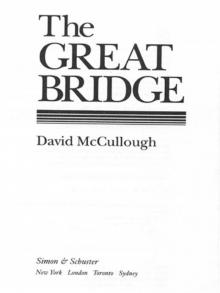 The Great Bridge
The Great Bridge